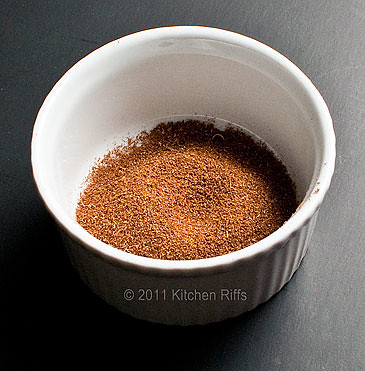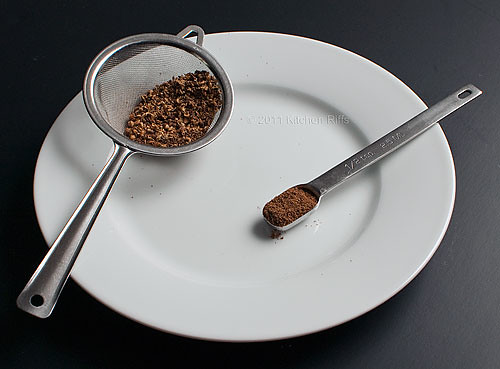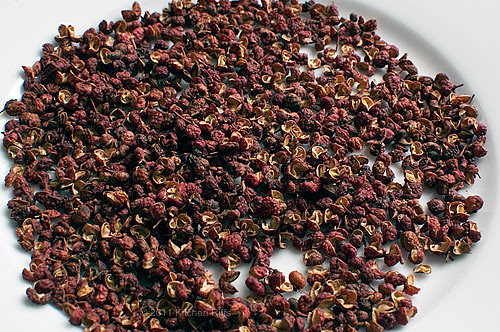The Forbidden Pepper
Most people in the United States have never tasted Sichuan peppercorns. From 1968 to 2005 they couldn’t, because it was illegal to import them into the US.
Were they banned because they were, like, really powerful? The good stuff, you know, that would propel your taste buds into spasms of wild abandonment? Were they heavily addictive, leading you on a lifelong downward spiral in your desperate search for more and better pepper highs?
Alas, no. They were banned because they could carry citrus canker (which can cause unsightly blemishes, making citrus fruit difficult to sell). Now Sichuan peppers are street legal again, as long as they’ve been heated to 160 degrees Fahrenheit before import (the high heat kills the canker bacteria).
Sichuan peppers aren’t really peppers at all. They’re not related to black pepper or chile peppers. They are actually the dried out pods of woody shrubs in the Zanthoxylum genus. Nor are Sichuan peppers really “hot” or pungent in the chile sense. Rather, they produce a kind of tingling numbness in the mouth or on the tongue that somewhat resembles a mild dose of novocaine.
For most people, the biggest attraction of Sichuan peppers is their glorious fragrance. They have a lemony-pepper aroma (and flavor) that is quite pleasing. The flavor adds an almost summer-like quality to food.
You can add whole Sichuan peppercorns to a dish as you’re cooking it. But I prefer to roast the peppercorns and then grind them into powder.
 |
| Roasted Sichuan Pepper Powder |
Recipe: Roasted Sichuan Pepper Powder
For this recipe, you need a small skillet, preferably cast iron, for roasting the Sichuan peppercorns. You also need a spice grinder (I use an electric coffee bean grinder that I reserve solely for spices). You can use a mortar and pestle if you choose, but that is a tedious process.
It’s hard to grind less than about ¼ cup of Sichuan peppercorns at a time, which will probably give you more ground pepper powder than you can immediately use. Unfortunately, the powder does deteriorate (losing fragrance and flavor) fairly quickly. So store the extra in an airtight container and try to use it as soon as possible. This recipe yields a little less than ¼ cup ground Sichuan pepper.
My recipe is adapted from Fuchia Dunlop, who currently is the best English-language writer on Chinese cuisine. Two of her cookbooks - Land of Plenty and Revolutionary Chinese Cookbook are marvelous, and I recommend both.
Ingredients
¼ cup Sichuan peppercorns (see purchasing information below)
Preparation
- Shake peppercorns in a sieve to knock loose any dust that may be clinging to them. Spread on a small white plate and sort through, discarding any twigs, leaves, black seeds, or other unwanted material. (The black seeds of Sichuan peppercorns have no real flavor or fragrance; all the action is in the husks.)
- Put sorted peppercorns in a small skillet (preferably heavy cast iron) and place over moderate heat. Stir peppercorns until they become fragrant (3 to 5 minutes), being careful not to scorch them.
- Dump the hot peppercorns into a coffee grinder/spice grinder and grind them fine. I force the ground powder through a fine sieve, since invariably the spice grinder leaves behind a few husks or twigs.
- Bottle in an airtight container and enjoy!
Most Chinese grocery stores carry Sichuan peppercorns. However, I’ve occasionally been disappointed by the quality of some that I’ve purchased. I’ve bought bags that turned out not to be fresh, and on one occasion bought a bag that contained dried mud. Gross!
For your first venture with Sichuan peppercorns, I recommend purchasing them from Penzeys Spice or another reputable, high-volume spice and herb specialist. Penzeys turns over its inventory rapidly, so the peppercorns you buy from them are likely to be fresh. And you really do want your Sichuan peppercorns to be as fresh as possible.
About Numbness
In Land of Plenty Dunlop suggests tasting Sichuan pepper before you use it to learn what the effect of the spice will be (and to determine if your spice is fresh). She recommends that you take one pepper, place it in your mouth, chew gently once or twice, and then spit it out. In a few seconds, you should feel a very mild numbness. (If you chew on more than one peppercorn, or chomp away for 20 or 30 seconds, the effect will be vastly heightened.)
Not everyone appreciates the sensation that Sichuan peppers produce. Dunlop writes in her Revolutionary Chinese Cookbook that Hunanese — who favor some serious heat in their food — rarely use Sichuan peppers because they dislike the numbing effect. But in her book on Sichuan cooking, Land of Plenty, she notes that this numbing also allows people to overload their recipes with chilies — and thus “consume more chilies than would otherwise be humanly possible!”
You may not enjoy the numbness that Sichuan peppercorns deliver. Personally, I can take it or leave it. I love the aroma, but too much numbness reminds me of a trip to the dentist. For this reason, I generally use only minimal amounts of Sichuan pepper in my cooking.
Probably a good thing. If the feds ever ban Sichuan pepper again, I won’t be tempted to seek out an illicit supply. No midnight runs to rural Missouri for me, the springs of my ’57 Chevy jacked up to accommodate heavily overloaded burlap bags bursting with Sichuan peppercorn sweetness. No revenuers chasing me, guns a-blazing, as I swerve down moonlit back roads, while from the passenger seat Mrs. Kitchenriffs pummels me senseless for getting us into another fine mess.
That kind of numbness I don’t need.




4 comments:
Thanks for the detailed descriptions. I love the numbness sensation of the peppercorns.
Hi Anonymous, doesn't Sichuan pepper have such great flavor? The numbness is a bit odd, but rather nice. Thanks for your comment.
I thought the seed of the Sichuan peppercorn was bitter. Have you heard that? If so, do you try to separate the seed from the hull?
Hi Anonymous, not particularly bitter, no. Chile powder (as opposed to the whole chile) is sometimes just a bit bitter, but Sichuan peppers really aren't a chile. So I guess my answer is I haven't experienced that. Thanks for the question.
Post a Comment